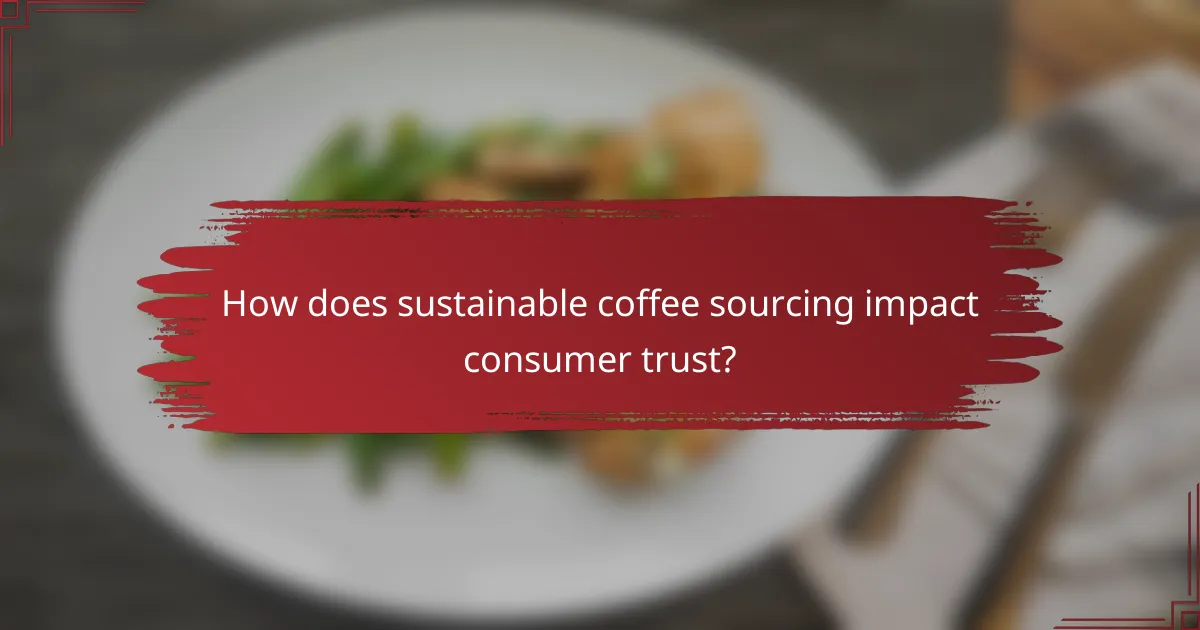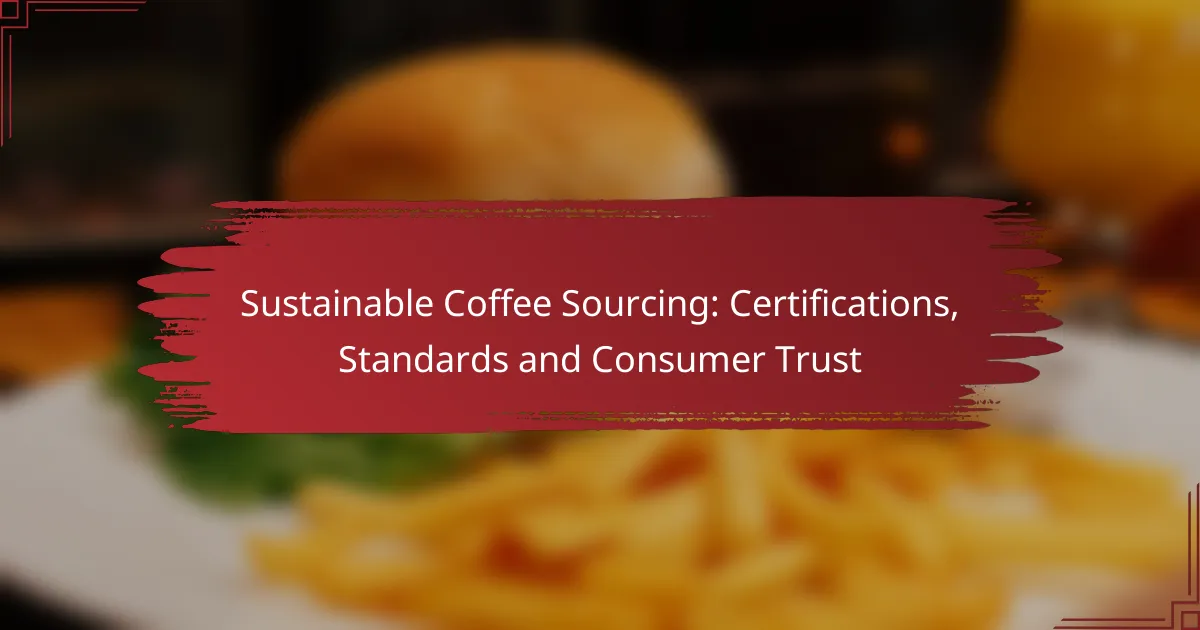Sustainable coffee sourcing plays a crucial role in building consumer trust by showcasing a brand’s dedication to ethical and environmentally responsible practices. Certifications such as Fair Trade, Rainforest Alliance, and USDA Organic serve as vital indicators for consumers, ensuring that their coffee aligns with specific social and environmental standards. By understanding the nuances of these certifications, consumers can make informed choices that reflect their values and support sustainable practices in the coffee industry.

How does sustainable coffee sourcing impact consumer trust?
Sustainable coffee sourcing significantly enhances consumer trust by demonstrating a commitment to ethical practices and environmental responsibility. When consumers know that their coffee is sourced sustainably, they are more likely to feel confident in their purchasing decisions and remain loyal to brands that prioritize these values.
Transparency in sourcing practices
Transparency in sourcing practices is crucial for building consumer trust. Brands that openly share information about their supply chains, including details on where and how their coffee is grown, can foster a sense of authenticity. For example, companies that provide traceability from farm to cup allow consumers to verify the sustainability of their coffee.
To enhance transparency, brands can utilize digital platforms to showcase their sourcing stories, including partnerships with local farmers and certifications obtained. This level of openness not only builds trust but also encourages consumers to engage with the brand on a deeper level.
Consumer awareness of certifications
Consumer awareness of certifications plays a vital role in sustainable coffee sourcing. Certifications such as Fair Trade, Rainforest Alliance, and USDA Organic signal to consumers that the coffee meets specific environmental and social standards. Familiarity with these labels can influence purchasing decisions, as consumers often seek products that align with their values.
Brands can improve consumer awareness by educating their audience about the meaning and importance of these certifications through marketing campaigns and product labeling. Clear communication about the benefits of certified coffee can enhance consumer trust and drive sales.
Brand reputation and loyalty
A strong brand reputation built on sustainable coffee sourcing can lead to increased consumer loyalty. When brands consistently demonstrate their commitment to ethical sourcing and environmental stewardship, they create a positive image that resonates with consumers. This can result in repeat purchases and word-of-mouth recommendations.
To maintain a positive reputation, brands should actively engage with their customers, respond to feedback, and continuously improve their sustainability practices. Regularly updating consumers on progress and challenges can further solidify loyalty and trust.

What are the key certifications for sustainable coffee?
Key certifications for sustainable coffee include Fair Trade, Rainforest Alliance, and USDA Organic. These certifications help consumers identify coffee that meets specific environmental and social standards, ensuring ethical sourcing practices.
Fair Trade certification
Fair Trade certification focuses on equitable trading conditions for farmers, ensuring they receive fair prices for their coffee. This certification promotes sustainable farming practices and supports community development through premiums that can be invested in local projects.
When purchasing Fair Trade coffee, look for the Fair Trade logo, which indicates compliance with standards that prioritize social equity and environmental sustainability. This certification is particularly relevant for consumers interested in supporting smallholder farmers in developing countries.
Rainforest Alliance certification
Rainforest Alliance certification emphasizes environmental conservation and sustainable farming practices. It requires coffee producers to adhere to standards that protect ecosystems, conserve biodiversity, and promote the welfare of workers and communities.
To identify Rainforest Alliance certified coffee, check for the green frog logo on packaging. This certification appeals to consumers who prioritize environmental stewardship and wish to support practices that mitigate climate change and habitat destruction.
USDA Organic certification
USDA Organic certification ensures that coffee is grown without synthetic fertilizers, pesticides, or genetically modified organisms. This certification promotes biodiversity and soil health, making it a popular choice for health-conscious consumers.
When selecting USDA Organic coffee, look for the USDA Organic seal on the packaging. This certification is particularly relevant in the United States, where consumers are increasingly seeking organic products for their perceived health benefits and environmental impact.

How do coffee certifications differ?
Coffee certifications vary primarily in their focus areas, standards, and requirements. While some certifications emphasize fair labor practices, others prioritize environmental sustainability or organic farming methods. Understanding these differences helps consumers make informed choices about the coffee they purchase.
Criteria for Fair Trade vs. Rainforest Alliance
Fair Trade certification focuses on ensuring that farmers receive fair wages and work under safe conditions. It requires adherence to specific labor rights, community development, and environmental sustainability practices. In contrast, Rainforest Alliance certification emphasizes sustainable farming practices that protect ecosystems and biodiversity, without the same strict labor standards as Fair Trade.
For example, Fair Trade requires a minimum price for coffee beans, while Rainforest Alliance does not set a minimum price but encourages practices that enhance environmental stewardship. Both certifications promote sustainability but from different angles, making it essential for consumers to understand what each label represents.
Impact on pricing and market access
The impact of coffee certifications on pricing can be significant. Fair Trade certified coffee often commands higher prices due to the guaranteed minimum price and the premium paid to farmers. This can lead to better income stability for producers, but it may also limit market access for non-certified coffee, which can be sold at lower prices.
On the other hand, Rainforest Alliance certified coffee may not always fetch a premium price, as it competes more directly with conventional coffee. However, it can open doors to markets that prioritize sustainability, appealing to environmentally conscious consumers. Understanding these pricing dynamics can help buyers choose coffee that aligns with their values while supporting fair practices and sustainability.

What are the benefits of sourcing certified sustainable coffee?
Sourcing certified sustainable coffee offers several advantages, including environmental protection, support for local farmers, and improved product quality. These benefits contribute to a more ethical and responsible coffee industry, fostering consumer trust and loyalty.
Environmental protection
Certified sustainable coffee is grown using practices that minimize environmental impact. This includes reducing pesticide use, conserving water, and promoting biodiversity through shade-grown methods. By adhering to these practices, coffee producers help protect ecosystems and combat climate change.
Additionally, certifications often require farmers to implement soil conservation techniques and maintain natural habitats, which further enhances environmental sustainability. Consumers can feel confident that their coffee choices support a healthier planet.
Support for local farmers
Sourcing certified sustainable coffee directly benefits local farmers by ensuring fair wages and better working conditions. Certifications often mandate that producers receive a premium price for their coffee, which can significantly improve their livelihoods. This economic support helps communities thrive and reduces poverty.
Moreover, many certification programs provide training and resources to farmers, enabling them to adopt more sustainable practices. This empowerment fosters resilience and enhances the overall quality of life for farming families.
Improved product quality
Certified sustainable coffee often boasts superior quality due to the careful cultivation methods employed by farmers. These practices, such as selective harvesting and organic fertilization, result in beans that are richer in flavor and aroma. As a result, consumers enjoy a more satisfying coffee experience.
Furthermore, the emphasis on quality control in certification processes ensures that only the best beans reach the market. This focus on quality can lead to higher customer satisfaction and increased brand loyalty among consumers who prioritize sustainability.

How can consumers identify sustainably sourced coffee?
Consumers can identify sustainably sourced coffee by looking for specific certifications and researching the practices of coffee brands. Understanding these elements helps ensure that the coffee purchased supports ethical and environmentally friendly practices.
Reading labels and certifications
Labels and certifications are key indicators of sustainable coffee sourcing. Look for well-known certifications such as Fair Trade, Rainforest Alliance, and USDA Organic, which signify adherence to specific environmental and social standards.
Each certification has its own criteria. For example, Fair Trade focuses on fair wages and working conditions for farmers, while Rainforest Alliance emphasizes biodiversity and ecosystem conservation. Familiarizing yourself with these labels can help you make informed choices.
Researching brands and their practices
Investigating brands and their sourcing practices is crucial for identifying sustainable coffee. Many companies provide transparency about their supply chains on their websites, detailing their sourcing methods and partnerships with farmers.
Look for brands that share information about their sustainability initiatives, such as direct trade relationships or community support programs. Engaging with customer reviews and third-party assessments can also provide insights into a brand’s commitment to sustainability.

What are the challenges in sustainable coffee sourcing?
Sustainable coffee sourcing faces several challenges, including verifying the authenticity of sustainability claims and navigating complex supply chains. These challenges can impact consumer trust and the overall effectiveness of sustainability initiatives in the coffee industry.
Verification of claims
Verification of claims in sustainable coffee sourcing is crucial for ensuring that products genuinely meet sustainability standards. Many certifications, such as Fair Trade and Rainforest Alliance, provide frameworks for verifying these claims, but the effectiveness can vary.
Consumers should look for reputable certifications that require rigorous audits and transparency in the supply chain. For example, certifications that mandate third-party verification can enhance trust, while self-reported claims may raise skepticism.
To avoid pitfalls, consumers can research brands and their sourcing practices. Checking for detailed information about sourcing and the specific certifications used can help ensure that the coffee they purchase aligns with their sustainability values.



